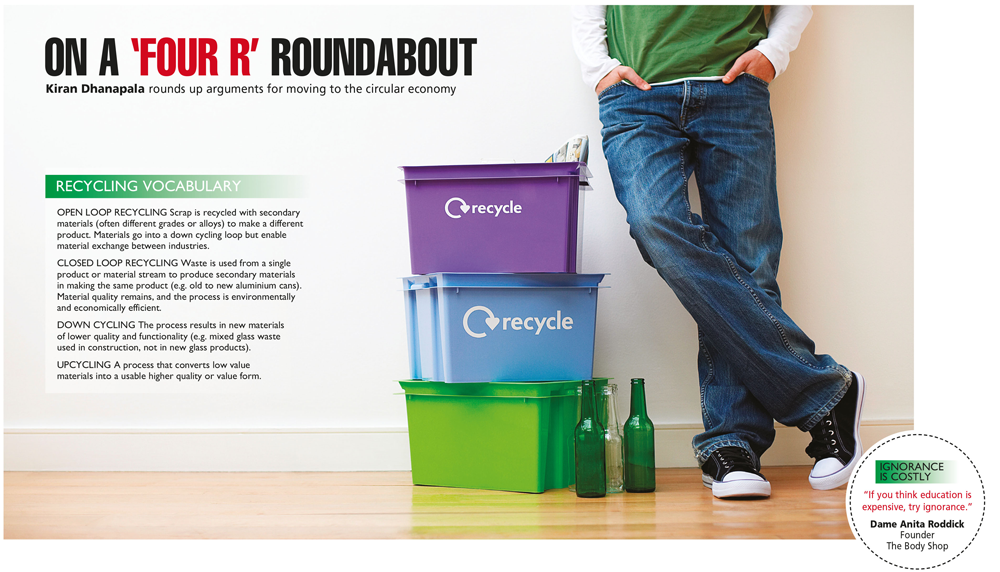THE CIRCULAR ECONOMY
ON A ‘FOUR R’ ROUNDABOUT
Kiran Dhanapala rounds up arguments for moving to the circular economy
The UNEP estimated sometime back that the global use of natural resources would reach 90 billion tonnes in 2017 and more than double in the period from 2015 to 2050. High income countries currently consume 10 times more resources per capita than their low income counterparts.
Conversely, sufficient evidence exists to show that there’s no increase in happiness from more consumption after people’s needs are met.
Decoupling of economic activity and wellbeing from resource use is vital. Consumption and production are two sides of the same sustainability equation. Smarter consumption and production are fundamental, as are education and awareness of what actually makes us happy or contributes to human wellbeing.
Our current economic model is linear: take, make and dispose. But limits in natural resources are forcing a transition to a more sustainable circular economic model: reduce, reuse and recycle. The flows in this circular economy will be aided by smart infrastructure and product design, standardisation and reuse, and recycling and remanufacturing.
The global waste market is expected to grow from US$ 285 billion in 2016 to 435 billion dollars by 2023 (at a compound annual growth rate of 6.2% from 2017 to 2023). Waste includes municipal solid waste (MSW) and industrial waste. MSW is expected to grow by 6.1 percent to reach 222.8 billion dollars in 2023. Plastics and e-waste are particularly damaging.
The Global Waste Recycling Market Outlook (2018) reveals that close to 48.2 million tonnes of e-waste was generated last year. Only 20-25 percent of this was formally collected and recycled. The remaining waste was landfilled or illegally disposed of in less developed countries.
Increasing waste arises from rapid growth amidst mounting environmental concerns. It will stimulate waste management services including recycling techniques, innovative technologies and advanced collection methods. This presents new business opportunities. Europe accounts for the largest share of the waste management sector (more than 30% in 2016) and is expected to continue to dominate this segment.
While a lot of waste continues to head to developing countries, the destinations are changing. China used to take in about half of the world’s paper and plastic recyclables or single stream waste but has stopped doing so. Its new ‘National Sword’ policy bans 24 types of solid waste including various plastics and unsorted mixed papers, setting tougher standards overall for contaminated waste.
Globally, recyclers are seeking new markets for recyclables. This will force countries to invest in waste management infrastructure
or look to Southeast Asian and other nations for waste management solutions.
Sustainability is about practising the ‘four Rs’ – viz. reduction, reuse, recycling and recovery. Recycling is only part of the solution, and must include improved collection and an overall reduction in the sources of waste. We need to focus more on reduction and reuse. All of us need to sort and clean our recyclables, and be accountable for the waste mountains around us.
Recycling is known but often not practised. Even in the EU, the average rate of recycling of household waste is a mere 40 percent – and only 60 percent in the case of packaging waste. This presents a gap between societal values and action. The gap exists because the market doesn’t price the damage or cost of waste. And so the polluter does not pay and market signals do not work.
Incentives are needed to stimulate behavioural changes both at the individual level and in the economy.
Stimulating individual behavioural changes implies a process whereby retailers offer discounts to those who bring their own bags, provide collection points for single stream waste – with the much needed raising of awareness of information that should go along with this –linking recyclers with bulk suppliers and so on.
It also implies having dedicated pollution taxes channelled to specific funds that scale up recycling and other waste management solutions. And there needs to be a business enabling environment with the right incentives to ensure that the private sector is involved in providing waste management solutions that are profitable.
R&D ideas need to be funded to scale for businesses to take up with venture capitalists, impact investors and the like, all of whom will play a role in aiding the scaling up of socially beneficial projects.
These are the future challenges. And economic policies will need to increasingly provide incentives that promote practices such as recycling that move us into a circular economy in the medium term.





